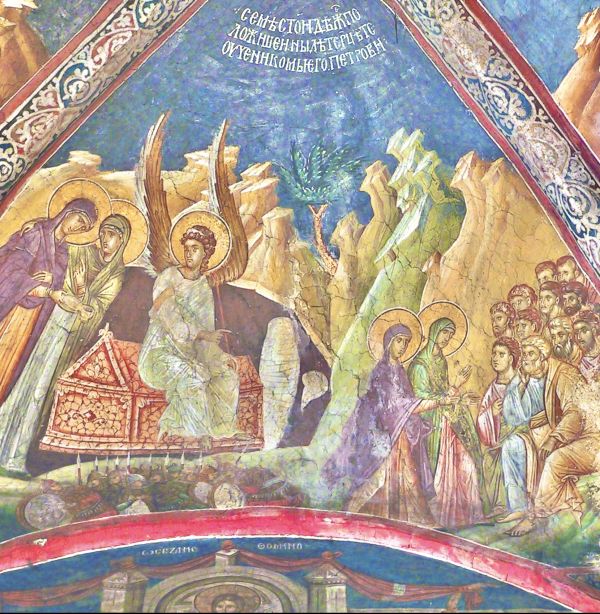«Now on the first day of the week, Mary of Magdala came to the tomb in the morning, when it was still dark, and saw the stone removed from the tomb» (Jn 20:1).
The fourth Gospel tells of the empty tomb found by Mary Magdalene who runs to the disciples to testify what she has seen. Peter and John run to see the Truth: Jesus is not in a place of death.
Francis and Clare were the disciples of the Resurrection, for their standard of living here below was that of humble and regenerated children of the Risen One.
Even after their death, the bystanders saw lights and miracles, bearing witness to the Gospel.
Regarding the departure of Clare, the Legend expresses it thus:
"On the day following the feast of the blessed Lawrence, that most holy soul departed from mortal life, to be rewarded with eternal laurel; and, the temple of the flesh having been disposed of, her spirit passed blessedly into heaven.
Blessed is this exodus from the valley of misery, which was for her entrance into the blessed life!
Now, in exchange for penury of food, they rejoice at the banquet of the citizens of heaven; now in exchange for humble ashes, blessed in the kingdom of heaven, they are made resplendent by the stole of eternal glory" (FF 3254).
Again the Sources:
"Therefore Clare, while she was alive, shone by the light of her merits: and now, that she is sunk in endless clarity, no less does she still shine, by the marvellous light of miracles, to the ends of the earth" (FF 3262).
Indeed, as the Papal Bull attests:
"After his death [...] there was brought to his sepulchre a sick man with a fallen sickness, who could not walk by himself because of the contraction of one leg: and, there before him, his leg resounded thunderously, and he was healed of both his infirmities" (FF 3309).
She ran to the tomb... and encountered life!
Clare, having entered into glory, sowed with Christ resurrection.
And Francis' own departure spread that joy that only the Lord can give.
"The friars and sons, who had flocked to the transit of the father, together with all the people, dedicated that night, in which the most high confessor of Christ had died, to the divine praises: those did not seem to be the funeral rites of the dead, but vigils of angels.
When morning came, the crowds, with tree branches and a great number of torches, among hymns and canticles escorted the sacred body into the city of Assisi.
They also passed by the church of San Damiano, where then dwelt with her virgins that noble Clare, who is now glorious in heaven.
There they paused a little while [...] Finally, with great rejoicing, they arrived in the city and buried the precious treasure with all reverence in the church of St George, because it was there that he had learned the letters as a child and there that he had preached for the first time. There, therefore, he rightly found, in the end, the first place of his rest" (FF 1250).
And again:
"The venerable father passed from this world's wreckage in the year 1226 of the Lord's incarnation, on the 4th of October, the evening of a Saturday, and was buried on the following Sunday.
The blessed man, as soon as he was taken up to enjoy the light of God's countenance, began to shine by great and numerous miracles" (FF 1251).
Now that he reigned with the crucified and risen Christ, to whom he had been perfectly conformed, he left traces of Light on earth, in His footsteps.
The tomb was empty! Divine energy and Life prevailed. Alleluja!
Easter «Resurrection of the Lord» (Jn 20:1-9)












